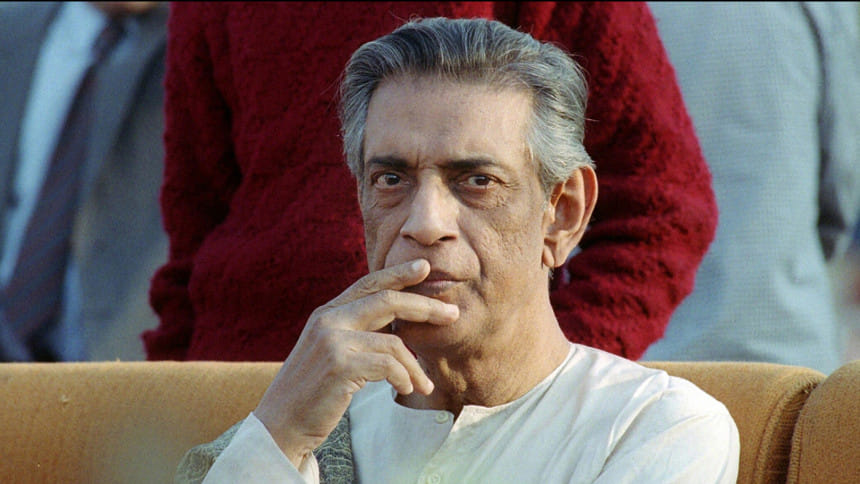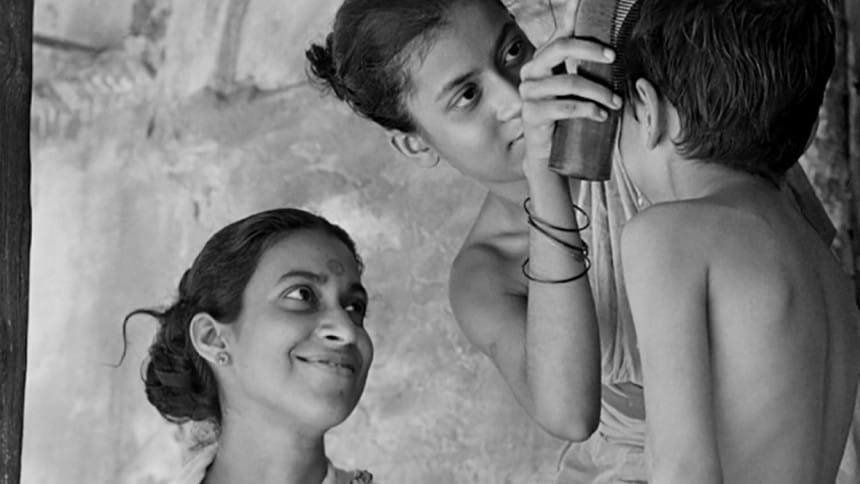A tribute to Satyajit Ray on his 99th birth anniversary

In 1950, Satyajit Ray, a young graphic designer at the time, set out to make a full-length film with his savings, without any experience in filmmaking. After years of financial and other struggles, he finally finished his first film in a trilogy, Pather Panchali (1955), one of the most iconic tales in Bengali cinema. Ray won a special jury prize at the Cannes Film Festival the following year.
Based on Bibhutibhuson's novel, Pather Panchali, followed by Aporajito (1956) and Apur Sansar (1959), is the greatest trilogy in the history of Bengali cinema.

"It is the kind of cinema that flows with the serenity and nobility of a big river. Without the least effort and any sudden jerks, Ray paints his picture, but its effect on the audience is to stir up deep passions. There is nothing irrelevant or haphazard in his cinematographic technique. In that lies the secret of its excellence," Akira Kurosawa, the legendary Japanese filmmaker and Ray's friend, remarked on Pather Panchali, in Moscow in 1975.
Ray's films are known for portraying the struggles and realities of ordinary individuals. His characters are simpletons, yet profoundly interesting. "Somehow I feel that an ordinary person–the man in the street if you like – is a more challenging subject for exploration than people in the heroic mold," Ray once said. "It is the half shades, the hardly audible notes that I want to capture and explore. My films are about human beings, human relationships, and social problems. I think it is possible for everyone to relate to these issues."

Be it the iconic train scene in Pather Panchali or the masterful portrayal of the dream sequence in Nayak, Ray's films interpret the deepest realisations about life and its intricacies. In his original screenplays, he preferred exploring the development of characters in a restricted time-space domain. Kanchenjungha (1962) shows 100 odd minutes in the life of a group in the hill-station of Darjeeling, while Nayak (1966) depicts twenty-four hours in a train.
Hirok Rajar Deshe, Devi, Charulata, Aguntuk, Aranyer Din Ratri, Jalshaghor, Gupi Gyne Bagha Byne, Pratidwandi and Ghare Baire among his other films, make us question the important aspects in life and what truly matters.

Martin Scorsese, George Lucas, Wes Anderson, Abbas Kiarostami, Francis Ford Coppola and Christopher Nolan along with several notable directors have been influenced by Ray's unique cinematic style and praised his works over the years.
In 2008, during an interview with journalist Ranjan Das Gupta, Martin Scorsese said, "I had grown up watching his classics, the Apu trilogy, Devi, Mahanagar and Charulata. Each appeared a classic unparalleled to me. In sheer terms of content and cinematic excellence, I rank Ray amongst the top ten directors of the last century."
The characters created by Ray as an author are iconic to this day. From Feluda's unbound intelligence to Professor Shanku's intrinsic curiosity, his characters have entertained and taught important life lessons to audiences across generations.
Ray successfully revived Sandesh, the children's magazine his grandfather Upendrakishore Ray founded, with his savings in 1961, and worked as an editor and writer for several years.
Ray penned his experiences of filming the Apu trilogy in the book, My Years with Apu: A Memoir. He also wrote essays on film, published as the collections: Our Films, Their Films (1976), Bishoy Chalachchitra (1976) and Ekei Bole Shooting (1979).
An illustrator, designer, music composer, artist, and cartoonist, Ray was a man of many talents. Twenty-four days before his death, Ray received an honourary Academy Award, becoming the first Indian to win an Oscar, in 1992. Audrey Hepburn, who presented Ray with the Oscar, said, "One of the greatest directors, at last, got his due."
Considered as one of the greatest artistes of all time and a real observer of human life, Ray will continue to teach us about existence and love through his films and literary works, for generations to come. He is truly a legend in the world of films and literature.
On the master storyteller's 99th birth anniversary, we honour him with his own words -- Maharaja Tomare Selam.

 For all latest news, follow The Daily Star's Google News channel.
For all latest news, follow The Daily Star's Google News channel. 



Comments